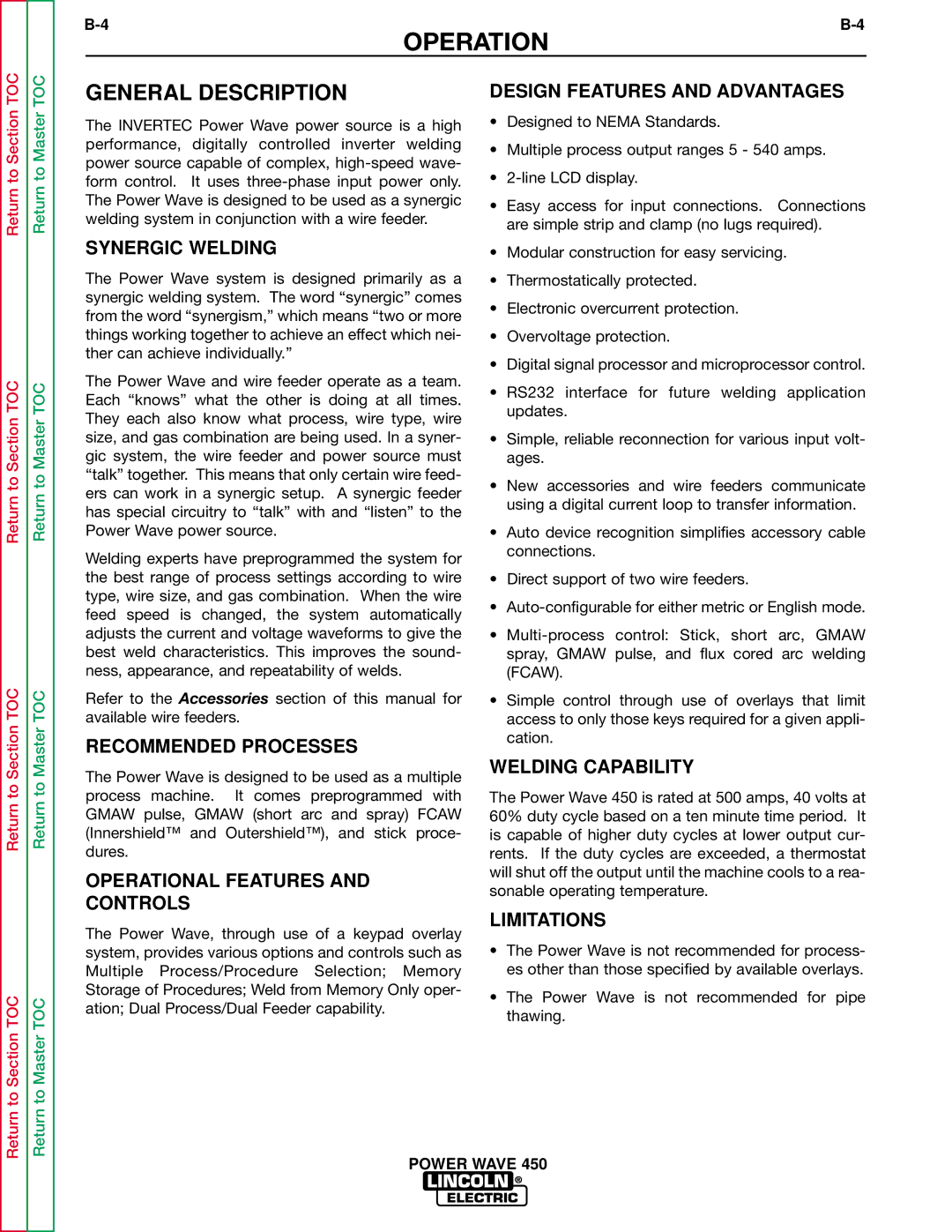
OPERATION
Return to Section TOC
Return to Section TOC
Return to Section TOC
Return to Section TOC
Return to Master TOC
Return to Master TOC
Return to Master TOC
Return to Master TOC
GENERAL DESCRIPTION
The INVERTEC Power Wave power source is a high performance, digitally controlled inverter welding power source capable of complex,
SYNERGIC WELDING
The Power Wave system is designed primarily as a synergic welding system. The word “synergic” comes from the word “synergism,” which means “two or more things working together to achieve an effect which nei- ther can achieve individually.”
The Power Wave and wire feeder operate as a team. Each “knows” what the other is doing at all times. They each also know what process, wire type, wire size, and gas combination are being used. In a syner- gic system, the wire feeder and power source must “talk” together. This means that only certain wire feed- ers can work in a synergic setup. A synergic feeder has special circuitry to “talk” with and “listen” to the Power Wave power source.
Welding experts have preprogrammed the system for the best range of process settings according to wire type, wire size, and gas combination. When the wire feed speed is changed, the system automatically adjusts the current and voltage waveforms to give the best weld characteristics. This improves the sound- ness, appearance, and repeatability of welds.
Refer to the Accessories section of this manual for available wire feeders.
RECOMMENDED PROCESSES
The Power Wave is designed to be used as a multiple process machine. It comes preprogrammed with GMAW pulse, GMAW (short arc and spray) FCAW (Innershield™ and Outershield™), and stick proce- dures.
OPERATIONAL FEATURES AND CONTROLS
The Power Wave, through use of a keypad overlay system, provides various options and controls such as Multiple Process/Procedure Selection; Memory Storage of Procedures; Weld from Memory Only oper- ation; Dual Process/Dual Feeder capability.
DESIGN FEATURES AND ADVANTAGES
•Designed to NEMA Standards.
•Multiple process output ranges 5 - 540 amps.
•
•Easy access for input connections. Connections are simple strip and clamp (no lugs required).
•Modular construction for easy servicing.
•Thermostatically protected.
•Electronic overcurrent protection.
•Overvoltage protection.
•Digital signal processor and microprocessor control.
•RS232 interface for future welding application updates.
•Simple, reliable reconnection for various input volt- ages.
•New accessories and wire feeders communicate using a digital current loop to transfer information.
•Auto device recognition simplifies accessory cable connections.
•Direct support of two wire feeders.
•
•
•Simple control through use of overlays that limit access to only those keys required for a given appli- cation.
WELDING CAPABILITY
The Power Wave 450 is rated at 500 amps, 40 volts at 60% duty cycle based on a ten minute time period. It is capable of higher duty cycles at lower output cur- rents. If the duty cycles are exceeded, a thermostat will shut off the output until the machine cools to a rea- sonable operating temperature.
LIMITATIONS
•The Power Wave is not recommended for process- es other than those specified by available overlays.
•The Power Wave is not recommended for pipe thawing.
